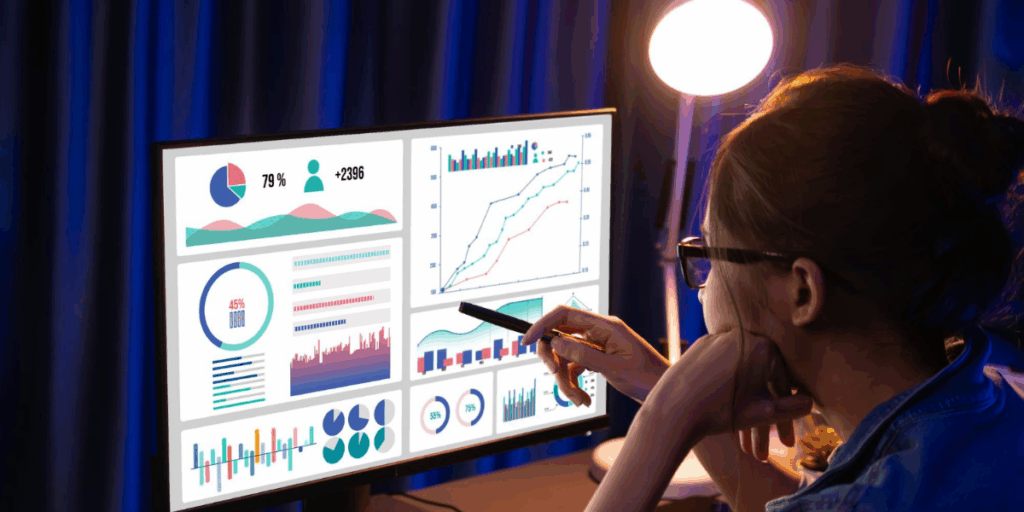

Quick Summary
BSc Statistics is a three-year program that aims to teach statistical probability and the interpretation of mathematical data. As a result, this course’s curriculum thoroughly examines probability and statistical methods, survey sampling, and numerical analysis. Although it is a full-time program, students can acquire a BSc in Statistics through remote learning, providing flexibility for those who wish to balance their studies with other commitments.
A BSc in Statistics (Bachelor of Science in Statistics) is an undergraduate program that centers on mathematical and statistical techniques for collecting, analyzing, interpreting, and presenting data. It equips students with the skills to solve real-world problems using statistical models and data-driven approaches.
Let’s learn what is BSc Statistics, Eligibility Criteria, Subjects, Syllabus, Specialization, Scope of Bachelor in Statistics in detail in this article.
BSc Statistics is a 3- years degree program. BSc Statistics is a discipline that focuses on gathering, organizing, analyzing, interpreting, and presenting data. It is a sub-set of mathematics that offers specialization in statistics and excellent job opportunities in the government and private sectors.
The admission process and the eligibility criteria for a bachelor in statistics are below:
Eligibility: 10+2 with Mathematics or Statistics as one of the core subjects, from a recognized board.
Minimum Marks: Generally 50–60% aggregate (varies by university).
Entrance Exams:
Some institutes conduct entrance tests (e.g., CUET for central universities), while others offer merit-based admissions.
Application Timeline:
Pursuing a BSc in Statistics offers several benefits, making it a popular choice among students interested in data and analysis. Some of the key advantages include:
The BSc in Statistics is a three years degree program with 24 papers. The curriculum is categorized into six semesters.
| Semester | Core Subjects | Practical/Assignments |
|---|---|---|
| Semester 1 | Descriptive Statistics, Probability Theory | Statistical Methods Lab |
| Semester 2 | Statistical Inference, Algebra | Probability & Inference Lab |
| Semester 3 | Sampling Theory, Linear Models | Sampling Techniques Practical |
| Semester 4 | Survey Methods, Time Series Analysis | Project/Field Work |
| Semester 5 | Statistical Computing using R, Multivariate Analysis | R Programming Lab |
| Semester 6 | Design of Experiments, Demography, Operations Research | Final Project & Viva |
Although the course may vary from college to college, the BSc statistics syllabus majorly include the following subjects in the curriculum:
| Subjects | Topic |
| Algebra | Vectors, Matrices, Equitation systems, Eigenvalues, linear independence, spans, orthogonally, |
| Calculus | Functions, limits, Derivatives, exponents, logarithms, differentiation, integration |
| Proof and Problem solving. | Mathematical analysis, proofreading techniques, hands-on different types of problem |
| Probability Analysis | Sample spaces, independence, continuous probability, distributions |
| Abstract Mathematics | Linear transformation, theorem of intermediate value, extreme value, inverse function |
| Data Science | Data analysis, visualization, regression, predictive modelling, interpretation |
| Sample Survey | Sample survey, Basic sampling method, stratified random sampling, |
| Applied Statistics | Index number, Demand Analysis, Utility and production functions, mathematical finance, time series, statistical quality control, sampling inspection plan, Indian official Statistics, Visual statistics, demography, educational and psychological statistics |
| C language | History and features of C language, control statement, String function use, Storage class, files |
| Statistical Inference | Estimation, interval estimation, testing hypothesis |
| Linear Model | General linear model, analysis of variance, straight line relationship between two variables |
| Stochastic processes | Definition, classification and illustration of stochastic processes, Markov chain definition, Poisson process |
| Eco Metrics | The objective behind eco metric models, general linear model, autocorrelation, forecasting |
| Bio-Statistics | The function of survival time, progressive, random censoring, risk theory, stochastic epidemic models, planning and design of clinical trials. |
The following are the year-by-year subjects list of BSc in statistics:
| Year | Subjects |
| First Year | Micro and Macro EconomicsStatistical TheoryFinancial AccountingAdvanced MathematicsIntroduction to Programming |
| Second Year | Probability and distributionRegression modellingScientific computingData collectionElectives |
| Final Year | Statistical inferenceStochastic processesApplied & Computational MathematicsElectivesProject and training |
There are various specialization courses in BSc Statistics courses. However, an aspirant for a degree in statistics can be admitted to the following courses:
The foundations of modern data analytics serve as the framework for this course. However, in order to handle complex situations and decision-making, this course provides an insightful analysis of the facts. Both theoretical and applied modern statistics are covered in the course.
This degree provides training and practical experience in modeling, analyzing, and interpreting real data that is required in business, research, and the economy. The theoretical and practical facets of modern statistics are also covered. Basic mathematics, probability, and statistics are covered in the first two years of the degree program.
The goal of this course is to solve a real-world problem that involves science or decision-making by using reasoning and mathematics. It helps students develop into independent learners prepared for prosperous careers in research, business, and academia.
The application of mathematics, statistics, scientific computing, and finance to financial trading and investing activities through computer programming is known as quantitative finance. Nonetheless, the course offers the chance to pursue a career in quantitative analysis.
There is a bachelor’s degree program in bioinformatics, which is the study of collecting and interpreting intricate biological data, including genetic codes. It is a field that uses the intersection of biology, statistics, and computation in organism biology, molecular biology, and biomedicine.
Numerous medical subjects are covered by the study of biology, such as cellular functions, disease treatment, and human body anatomy. Using mathematical and computational methods to solve complex biological and biomedical issues is the focus of computational biology.
A bachelor’s degree in financial mathematics with honors permits employment in banking and business. This course develops mathematical skills; in this regard, the curriculum discusses using mathematical concepts to solve financial issues.
The field of biostatics develops the application of statistics in biology.In this sense, a three-year honors program is the BSc in Statistical Biology. Nonetheless, a broad range of mathematical and statistical techniques and their applications in biology are covered in this course’s curriculum.
To secure admission in top BSc Statistics colleges like DU or BHU, keep the following in mind:
Below is a detailed comparison between BSc Statistics and BSc Statistics (Honours) based on key parameters:
| Parameters | BSc Statistics | BSc Statistics (Honours) |
|---|---|---|
| Qualification | Bachelor of Science in Statistics | Bachelor of Science in Statistics (Honours) |
| Course Overview | Focuses on data collection, classification, and interpretation. | Offers a more in-depth study of data collection, segregation, and statistical analysis. |
| Duration | 3 Years | 3 Years |
| Eligibility | 10+2 from a recognized board with Mathematics as a core subject. | 10+2 with a minimum of 55% marks (relaxable for reserved categories) and Mathematics. |
| Admission Process | Based on merit or entrance exams. | Entrance exam or merit-based, depending on the institution. |
| Average Annual Fees | ₹20,000 – ₹1,50,000 | ₹30,000 – ₹2,00,000 |
| Top Colleges | Fergusson College, St. Xavier’s, Mount Carmel, Christ University, etc. | BHU, AMU, Assam University, BJB College, DAV University, Dibrugarh University, etc. |
| Average Salary | ₹4.5 – ₹8 LPA | ₹5 – ₹8 LPA |
The BSc Statistics courses scope is vast and provides various job opportunities in the government and private sectors. However, there are many job opportunities that are extensively in trend:

A statistician is a person who is in charge of using theoretical or applied statistics to provide the best results. High responsibility and constant demand characterize this position in the public and private sectors. To address real-world problems, statisticians employ statistical models and approaches. They collect data, analyze it, and interpret it to aid several commercial decision-making processes. The average salary of a statistician is 5.8 LPA.

A marketing analyst is an expert who analyses data supporting a business’s marketing. This expert plays a vital role in decision-making for organizational betterment, such as boosting sales or streamlining marketing initiatives with the information they discover. The average salary of a market researcher analyst is 4.2 LPA.

There is an opportunity for a candidate to become a technical content writer after having a statistics degree. Every government agency, as well as the business sector, needs writers who are skilled at both creative writing and data analysis presentations. A degree in statistics plays a key role in it. The average salary of a technical writer is 6.9 LPA.

A candidate can also become a data consultant after a bachelor’s of statistics and can play a vital role in decision-making for an organization. The knowledge of statistics plays a vital role for a consultant to perform surveys and conclude the sampled data using various statistical methods. A consultant earns on an average 13.4 lakhs per annum.

There is an opportunity for a bachelor in statistics to join the healthcare sector as a biostatistician. The job responsibility of a biostatistician is to conduct studies, create plans, analyze outcomes, and collaborate with a group of scientists and researchers. The average salary of a biostatistician is 5.7 LPA.

Data from print media, web content, translations, product descriptions, and advertising copy are all evaluated and interpreted by content analysts. A content analyst analyses the trend and suggests the themes and tone of the article to release. The average salary of a content analyst is 4 LPA.

A researcher who conducts research is typically a research associate. The researcher associated with the research department of any organization, including the government, analyses the data and contributes creative ideas for the advancement of the organization. In addition to being essential to research, statistics offers the chance to work as a research associate and earn a sizable salary. A research associate earns on an average 4.5 LPA.

BSc statistics opens a wide range of career opportunities, including data analysis. Data analysts are crucial in an organization and advise management and stakeholders. A data analyst’s primary responsibility is to study the data and identify the vital information that could be useful to the organization. The average salary of a data analyst is 6 LPA.

Usually, financial analysts work in banks, financial institutions and finance departments. They advise companies, the government and people on how to spend money to make a profit. They evaluate the performance of bonds, equities, and other financial products. The average salary of a finanicial analyst is 5.8 LPA.

Every industry’s account department is founded on data. Additionally, statistics play a challenging role in this field. So, after earning a degree in statistics, a candidate can also work as an accountant. The average salary of an accountant is 3.3 LPA.
Salary Source: Ambition Box

| Book Name | Author(s) |
|---|---|
| Fundamentals of Applied Statistics | S.C. Gupta & V.K. Kapoor |
| A Brief Course in Mathematical Statistics | Elliot Tanis & Robert V. Hogg |
| Introduction to Methods of Numerical Analysis | S.S. Sastry |
| Theory and Analysis of Sample Survey Designs | Daroga Singh & Fauran S. Chaudhary |
| Introduction to Statistical Theory | Charles J. Stone, Paul Gerhard Hoel & Sidney C. Port |
| College Name | Average Fees (INR) |
|---|---|
| Hindu College | 20,460 |
| Lady Shri Ram College for Women | 20,670 |
| Kirori Mal College | 14,595 |
| Ramjas College | 14,610 |
| Sri Venkateswara College | 14,555 |
| Shaheed Rajguru College of Applied Sciences for Women | 17,840 |
| College Name | Average Fees (INR) |
|---|---|
| St. Xavier’s College | 7,187 |
| DG Ruparel College of Arts, Science and Commerce | 7,005 |
| Ramnarain Ruia Autonomous College | 7,450 |
| Kishinchand Chellaram College | 10,735 |
| NMIMS | 1,52,000 |
| Elphinstone College | 5,695 |
| College Name | Average Fees (INR) |
|---|---|
| Mount Carmel College | 42,000 |
| Christ University | 35,000 |
| St. Joseph’s College | 32,950 |
| Kristu Jayanti College | 50,000 |
| Indian Academy Group of Institutions | 1,92,200 |
| Reva University | 35,000 |
| College Name | Average Fees (INR) |
|---|---|
| St. Ann’s College for Women | 17,155 |
| St. Joseph Degree and PG College | – |
| AV College of Arts, Science and Commerce | 22,605 |
| Indian Institute of Management and Commerce | 37,500 |
| GITAM | 65,000 |
| Aurora Degree College | – |
| College Name | Average Fees (INR) |
|---|---|
| Loyola College | 16,790 |
| Presidency College | 1,270 |
| Bharath University | 40,000 |
| SDN Bhatt Vaishnav College for Women | 4,820 |
| Dr. BR Ambedkar Govt. Arts College | 1,645 |
| SCSVMV University | 38,000 |
Refer to the following points to guarantee a spot in one of the best BSc Statistics colleges offered by DU, BHU, etc:
Even though a candidate can have a successful career after earning a BSc Statistics courses, if they wish to continue their studies, there are also chances for higher studies.
Below mentions are the details of higher studies after BSc Statistics:
It is a two years master’s degree program. A candidate willing to pursue higher studies after BSc in statistics can be admitted to this post-graduate degree program in Statistics. MSc in Statistics facilitates scholars to get in-depth knowledge of the subject and enhances data analytical skills. A candidate must have possessed 55% in his graduation to be admitted to this course.
The MSc in Actuarial Science is a two years master’s degree course. It is a multidisciplinary curriculum that uses qualitative and quantitative (mathematical and statistical) methodologies to assess and analyze various risks in both financial and non-financial sectors, such as the banking and insurance industries. A graduate of statistics can also pursue his higher studies through this course. Admission to this course, however, has certain eligibility criteria to fulfil first.
A Master in Business Administration is a two-year degree program, and a bachelor of statistics can also pursue his higher education with this professional course. MBA is one kind of professional degree where the candidate has to choose one discipline like finance, marketing, data science etc. Even though there are many top MBA colleges in India, IIM is the top, which takes admission through CAT only. So to pursue an MBA the candidate has to qualify for the entrance exam along with graduation.
A Master’s in applied statistics is one of the most tremendous courses after a BSc in statistics. It is a two years degree program that develops mathematical and analytical skills to interpret the data and conclude the best result.
It is a two years post-graduate diploma course considered equivalent to a master‘s degree program. A statistics graduate can pursue a PGDBM instead of an MSc or MBA. This course is ideally less expensive; meanwhile, pursuant can earn by working in any organization.
| Job Role | Industry | Average Salary (INR/year) |
|---|---|---|
| Data Analyst | IT, E-commerce, Finance | ₹4–6 LPA |
| Statistician | Government, Research | ₹5–7 LPA |
| Risk Analyst | Banking, Insurance | ₹6–8 LPA |
| Actuary (with additional qualification) | Insurance | ₹10–20 LPA |
| Market Research Analyst | FMCG, Startups | ₹3–5 LPA |
The three-year BSc Statistics program offers a variety of business and employment options, including positions as statistical officers and data analysts, among many others. One interesting way to maximize the demand for statistical expertise and popular content types across a range of job opportunities is through content analysis. Apart from this, anyone can also become a Subject Expert in Statistics at Chegg India and earn a good side income by just simply registering for either Q&A or TBS opportunities to become a Chegg expert.
It depends on your career goals. BSc Computer Science is better for software development and IT roles, while BSc Statistics is advantageous for data analysis and research positions. Assess your interests and the job market in your area.
The B.Sc Statistics course is a 3-year undergraduate program that focuses on key concepts such as Probability, Statistical Methods, Numerical Analysis, and Survey Sampling. These subjects are crucial for analyzing statistical data and finding solutions to various statistical problems.
Yes. You can appear for UPSC, SSC, IBPS, and Indian Statistical Services (ISS) exams.
BSc Statistics can be tough due to its emphasis on mathematics, data analysis, and problem-solving. However, with dedication, practice, and a passion for numbers, it becomes manageable. The skills you gain are highly rewarding and open doors to many career opportunities.
Absolutely. Many students pursue M.Sc in Data Science or PG Diplomas in Data Analytics to enter this booming field
Yes, you can definitely pursue Chartered Accountancy after completing your BSc. Chartered Accountancy is a course that starts from a very beginner level and builds to the expert level. Anyone from any field can enroll in this course.
The B.Sc Statistics course typically spans over 3 years and includes core subjects like Descriptive Statistics, Probability and Probability Distributions, Linear Algebra, and Mathematical Analysis
The scope of a BSc in Statistics includes careers in data analysis, actuarial science, market research, quality control, biostatistics, and academic research. Graduates can work in industries like finance, healthcare, government, and tech, utilising statistical methods to interpret data and support decision-making processes. Further studies or specialisations can lead to advanced positions in data science, research, or teaching.
The salary of a BSc in Statistics in India typically ranges from ₹3,00,000 to ₹8,00,000 per annum, depending on the industry, location, and experience level.
BS Statistics can be a good course if you have an interest in data analysis, research methodology, and quantitative reasoning. It offers valuable skills applicable in various fields such as business, healthcare, and social sciences. Consider your career goals and interests when evaluating its suitability.

Authored by, Gagandeep Khokhar
Career Guidance Expert
Gagandeep is a content writer and strategist focused on creating high-performing, SEO-driven content that bridges the gap between learners and institutions. He crafts compelling narratives across blogs, landing pages, and email campaigns to drive engagement and build trust.
Editor's Recommendations
Chegg India does not ask for money to offer any opportunity with the company. We request you to be vigilant before sharing your personal and financial information with any third party. Beware of fraudulent activities claiming affiliation with our company and promising monetary rewards or benefits. Chegg India shall not be responsible for any losses resulting from such activities.
Chegg India does not ask for money to offer any opportunity with the company. We request you to be vigilant before sharing your personal and financial information with any third party. Beware of fraudulent activities claiming affiliation with our company and promising monetary rewards or benefits. Chegg India shall not be responsible for any losses resulting from such activities.